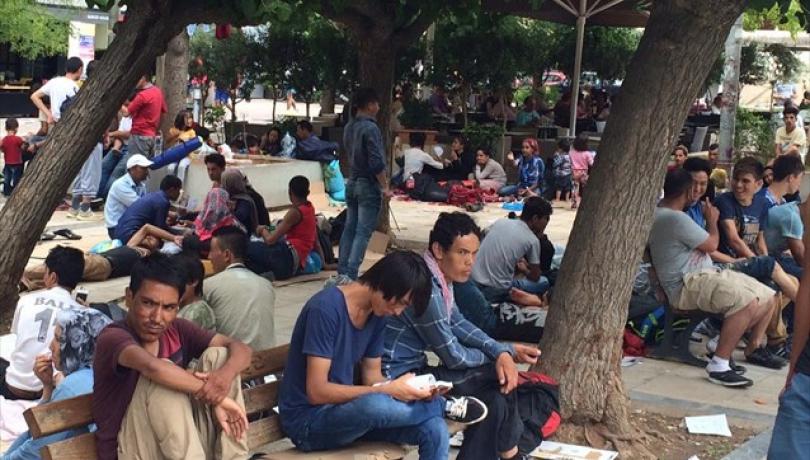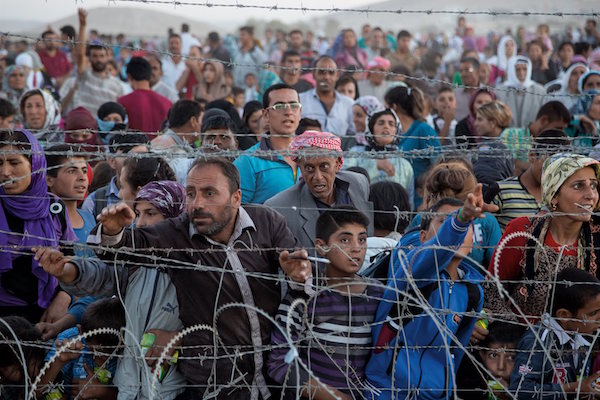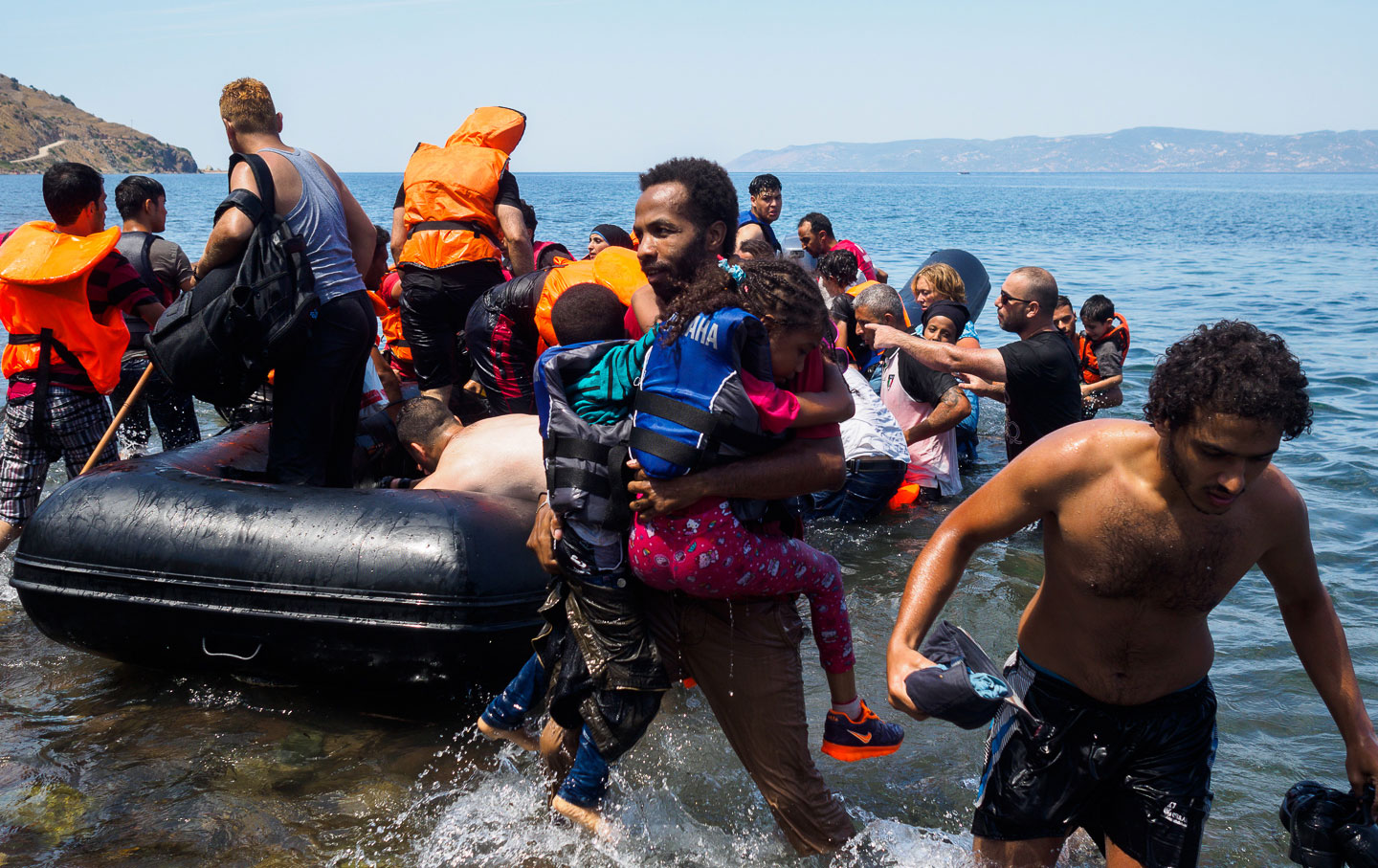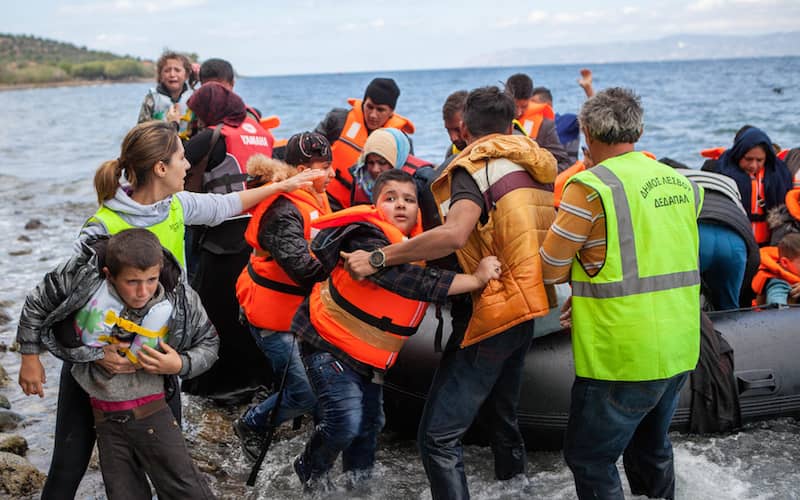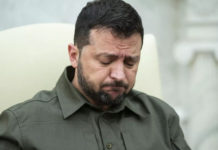There are thousands of them. The majority thrown away from their countries as a result of the military campaigns of last 15 years by the United States, France, Great Britain and NATO, the states and organisations used to realize the neoconservative project and the “Clash of Civilisations” scenario. These campaigns literally erased a large part of the Middle East, invoking the need to protect “human rights”, promote “democracy”, stop “terrorism” or destroy the non-existent nukes of Saddam. One of the results was the “production” of millions of refugees, wondering here and there.
One year now, various forces and in different ways are helping fuel the already existing, but in much smaller numbers, movement of refugees/immigrants to Europe. This provoked a backlash in European societies. As a result European governments act unilateraly closing the borders with Greece and refugees are now trapped in this country, a member of the European Union. Greece is a country already destroyed by the financial war its own “partners” and IMF have launched against it. The Greek government, under heavy pressure from every direction, is retreating and is accepting for the country to become “temporary” shelter for tens of thousands of people, while the Turkish regime does not do anything to stop the flow of people to Greece. The Greek tragedy enters its second phase.
The situation in Idomeni, the frontier between Greece and FYROM gets worse every passing day. Our friend, the Greek journalist Nikos Servetas has spent some days there. We asked him to share with readers of “Defend Democracy Press” some of his impressions.
CHECKPOINT IDOMENI
By Nicos Servetas
Τhe first thing that surprises a visitor to Idomeni is at the very entrance of the village. A traditional house is transformed into the Western Union branch, the currency exchange and money transfer service. That service is located next to the closed and long abandoned Greek Post office.
One wonders. Why Western Union has created a branch office in a remote Greek village which has only 120 residents and is located 300 metres from the northern borders of the country?
The answer is that 15.000 refugees who were expecting to cross the greek border towards the central and northern Europe, something that initially was their plan, do not seem able to succeed it, at least in the short term. They will rather not move where they hope. Most probably, Western Union knew before the refugees what would happen with them.
As we approach the refugees’ camp we see just on the side of the disorderly placed tents, a yellow truck with DHL label, filled up with packages sent by friends and relatives. Volunteers and Greek and foreign organisations are struggling to distribute them to the refugees. Among them there are religious US and Australian ones, ecologist groups from Netherlands and members of English and Italian left movements.
All these people, in cooperation with the international NGOs, are trying to handle the unexpected turn the situation took. The camp was originally created as the location of temporary stay (i.e a couple of hours) for between 500 and 1000 people. There are still signs indicating, in English and Arabic, the timetables of food distribution, the precise district of the infirmeries and the opening hours of the interpreters’ offices. Moreover, there are tall towers with the sign “Meeting Point”, bio toilets and a kitchen. All this, estimated to cover the needs of up to 1000 people. The doctors that were first meant to examine 20-30 children per day are now expected to examine 500 in the best case scenario.The volunteers are gradually getting tired.
“The refugee wave became huge in the beginning of 2015, when UN and the various NGOs reduced the alimentary assistance for the refugees located in Lebanon and Turkey, from 6 dollars to 14 cents per day, per person. The situation got worse when after the shutting down the schools in June, children who were eating there, had not even that” stated Giannis Mouzalas, minister of migration, at an event in Athens. These people left their countries due to the war, to later leave the camps they were transferred due to starvation, looking for a place where they would feel safe.This is the vital difference between a refugee and an immigrant: the immigrant heads somewhere, while the refugee escapes from somewhere. These people are forced to bypass Idomeni but the government of FYROM closed the borders, by violating the international law on asylum seekers.
“I am swearing all day long but I also feel sorry for them. There was a woman who came to me the other day, asking for a pot to cook for her three children and spoons for them to eat. I gave it to them. I even cooked for them whatever was in my fridge. At the same time, there were other people taking the woods I had for warming my house up the rest of the winter. They wanted to warm their tents up but how am I supposed to get woods now? I find myself wishing for them to go away, but where are they supposed to go? They are not allowed to go anywhere else. There are only some Syrians allowed to go further every day. What are the rest going to do? The ones from Afghanistan or Pakistan?” Ms. Dimitra is an old retired peasant, the widow of a postman. One of the 120 residents of Idomeni.
Some kilometres south of the borders, on the way from Idomeni to Thessaloniki, at Diavata, there is another camp. One among many others that are to be created in Greece, in order to host the refugees who are not coming from Syria, are not driven away from war zones and have no right for asylum. Thwenty year old Hadize is Azeri. Her parents come from Afghanistan but she was born in Iran. I asked the permission of the police officers, who are guarding the camp, to take her to the central square in Diavata. “She needs no permission, she is a free person and can go wherever she wants to” the policeman told me. Her brother, 10 years older than her, did not share the same opinion though.
Her brother’s company was proven to be fortunate after all, as even if he did not speak English himself, he was willing to answer my questions, with the help of his sister who was translating. This is how I found out that it is not only Afghanistan where they cannot go back, as they are Shiites themselves and they will encounter Sunites’ aggressivity, it is also Iran where they cannot think themselves getting back to. In that case, Ahmet would be enlisted in the army and enforced to fight against ISIS. Azeris are always in the war’s front line and it goes without saying that they are the ones who are killed first, as embodied in the very example of their own father.
“I want to live somewhere safely, to complete my studies and create my own family. If I am forced back then I am going to kill myself”. These were the last words of Hadize, in the end of our conversation.
When I paid for the tea we had, the girl told me:
-How can I pay you back for that tea?
-Please, it is on me.
We left. On our way back to the camp she went on saying:
In our language, when we are questioning how we are supposed to pay something back, we mean that what we got from someone is so overwhelming that there is no equivalent way to repay.
-But it was just a tea.
-No, it was our discussion, it was the walk we took, it was that you have been listening to me for so long. It was all that. This is how we express gratification.
Hadize is relatively advanced in English and regardless her limited practical ability of sharing her cultural legacy and her tribe and religion’s particularities, she managed making -at least to me- clear her special story and the reason why she is asking for asylum. There are barely 20 out of the 2.500 people from Afghanistan speaking English, living now in Diavata. Who is going to listen to the other people’s stories or just understand their reasons for asylum seeking, before sending them to a country like Turkey or back to the war, against an enemy they don’t even know?
March 12, 2016
